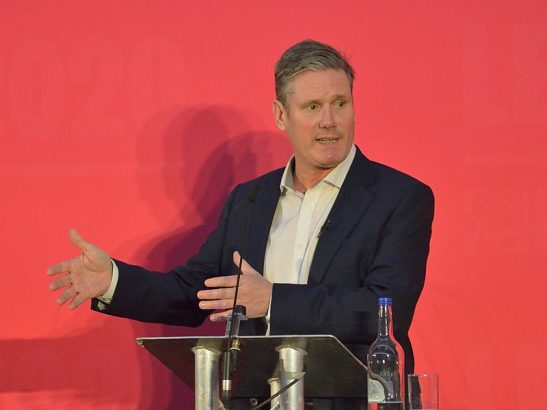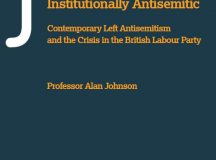In 2021, after the EHRC-mandated rule changes to tackle antisemitism had been approved by his party, Sir Keir Starmer claimed ‘We’ve now closed the door on a shameful chapter in our history’. Euan Phillips of Labour Against Antisemitism argues this is complacent. Many parts of the party and its affiliated organisations are still rife with left antisemitism and an unhinged ‘antizionism’. The door has not been closed.
Labour’s Complacent Narrative
Although a strain of left-wing antisemitism existed within the Labour Party and wider Labour movement before Jeremy Corbyn, his election as leader in 2015 brought antisemitism into the British political mainstream. The escalation of both online and offline anti-Jewish racism across the Labour Party eventually resulted in an investigation and report by the Equalities and Human Rights Commission (EHRC) that concluded the Labour Party had been responsible for ‘unlawful acts of harassment and discrimination’ against Jews. A wide range of recommendations were made including the implementation of a new independent complaints process, developing a culture of zero tolerance of antisemitism, and improving education and training.
Corbyn’s successor as party leader, Sir Keir Starmer, accepted the findings of the report and committed the party to implementing its recommendations, although he was unable to do so until the following year’s party conference, 11 months later. On the evening after the EHRC-mandated rule changes to tackle antisemitism had been approved, Starmer issued a press release stating, ‘We’ve now closed the door on a shameful chapter in our history’. With the inner-party battle over the rule changes won, Starmer seemed confident the crisis of Labour Party antisemitism was over.
The five-day conference was choreographed to present a political party moving decisively away from the institutional antisemitism of the Corbyn era. There was the return of Dame Louise Ellman, the widely respected Jewish former MP who had resigned from the party in October 2019. (It has not been disclosed whether Starmer apologised to Dame Louise for his own attempt, when still Corbyn’s loyal shadow cabinet member, to minimise her concerns during an interview with Andrew Marr, when he said he did not accept her reasons for leaving and that he was ‘100 per cent behind Jeremy Corbyn.’) The vote on the EHRC rule changes was easily passed, despite pre-conference briefings that there would be serious opposition from the Hard Left. Keir Starmer used his conference speech to publicly ‘welcome home’ Ellman, and was met with rapturous applause, captured by TV cameras.
Jewish Labour Party members then took turns to underline the leader’s message. One described the Labour Party as ‘turning the page on the blight of anti-Semitism’ while Jewish Labour Movement (JLM) Chair Mike Katz praised Starmer for his ‘strong moral leadership’ and ‘unbending commitment to root out antisemitism.’ The message was clear: the Labour Party’s antisemitism crisis was over, and the British Jewish community could trust it once again.
Labour’s post-EHRC narrative, then, is that Jewish Labour members referred the Labour Party to the EHRC, the EHRC investigated and made recommendations, and now Labour is, in Margaret Hodge’s words, ‘[slamming] the door on the darkest period of Labour’s long and proud history’. It is a simple, powerful and reassuring narrative. Ahead of local council elections in May 2022 and a likely general election in 2024, those elements of the Jewish community who are strongly aligned with the Labour Party leadership have chimed in with this narrative. Dissenting voices are being ignored.
The trouble is, Labour’s narrative is misleading, Labour’s understanding of the problem of contemporary antisemitism is still too narrow, and the measures taken so far to counter the antisemitism remain inadequate.
The door, in fact, remains ajar
While few would argue the current leadership is not a significant improvement on the former regime (improvements under Starmer include his sacking of Rebecca Long-Bailey after she promoted an article that contained an antisemitic conspiracy theory, suspending Jeremy Corbyn for his post-EHRC comments then removing the whip when his suspension was lifted, appointing a highly respectable antisemitism advisory board, and delivering a strong speech to the Labour Friends of Israel [LFI\ that criticised antizionism) there is a danger that the depths to which to the Corbyn-era party fell are making the current situation look better than it is. A snapshot of the Labour Party today reveals an organisation with ongoing and systemic challenges.
Suspensions: why only Corbyn?
Sir Keir Starmer and the Labour General Secretary David Evans drew plaudits for reacting quickly on the day of the EHRC report publication and suspending Jeremy Corbyn after the former leader claimed that ‘the scale of the [antisemitism] problem was also dramatically overstated for political reasons by our opponents inside and outside the party, as well as by much of the media’. Despite a bungled internal process that saw Corbyn’s suspension later lifted, he remains outside the Parliamentary Labour Party (PLP), having had the party whip withdrawn by Starmer. Unfortunately, however, no other Labour MP has been publicly sanctioned despite complaints.
- Labour Against Antisemitism (LAAS) recently submitted complaints against Easington MP Grahame Morris (specifically for his directorship of a website that contains substantial antisemitic content, but also including his history of making what in LAAS’s view are antisemitic comments) and Brighton Kemptown MP Lloyd Russell-Moyle (for his apparent apology to ex-party members who were ‘purged or set up with false allegation’ of antisemitism, along with other previous incidents). No action has been forthcoming.
- The Campaign Against Antisemitism (CAA) has also submitted complaints direct to the leadership on 15 sitting Labour MPs, including former Shadow Chancellor John McDonnell and current Deputy Leader Angela Rayner, all of which have reportedly been ignored.
- There has been no public censure of 25 Labour MPs and peers who signed a letter in support of the expelled film director Ken Loach, removed from the party for his support of the proscribed group Labour Against the Witch-hunt.
Even if these reports are not meeting the threshold for an internal investigation there is no reason why Starmer cannot demonstrate ‘zero tolerance’ and personally remove the party whip from these MPs, having done so for Corbyn.
There is further evidence that as with MPs, cases of antisemitism against Labour councillors are also being avoided, bungled, or kept out of public view.
- Since Starmer became leader in April 2020, LAAS has reported 25 Labour councillors, but only a handful have been publicly suspended and even fewer expelled – and action is often only taken following media inquiry.
- Recent examples include Councillor Zafar Islam, reported by LAAS for antisemitism in September 2021 but still sitting as a Labour councillor five months later, and Anne Pissaridou, allowed to regain her place in the Labour group on Brighton Council despite a suspension for antisemitism in August 2020.
There are further areas of concern that speak to a reluctance by Starmer to embrace the zero tolerance culture demanded by the EHRC.
‘Israel Obsession remains at the top of the Labour Party’
So ran the headline in the Jewish Chronicle in October 2021. ‘An analysis of frontbenchers’ Twitter activity over the past 12 months showed that shadow ministers posted or shared 832 tweets about Israel and the Palestinians compared to 674 on Iran, Yemen and Syria.’ Last month/earlier this month 22 Labour MPs broke the party whip to vote against a ban on BDS in public pension funds (the whip instruction had been to abstain on the vote), while chair of Labour Friends of Palestine and Middle East, Julie Elliott, was criticised for comparing the situation in Ukraine to that in Israel and Palestine.
Labour and Hamas: May 2021
During the May 2021 conflict between Israel and Hamas, incendiary antizionist (and often explicitly antisemitic) rhetoric exploded across the ‘progressive Left’ in the US and UK. The massive increase in antisemitic activity during this period was detailed in the Community Security Trust (CST) report ‘The Month of Hate: Antisemitism & extremism during the Israel-Gaza conflict’. Parts of the Labour Party enabled and condoned this activism.
- Labour MPs were seen attending pro-Palestinian rallies at which antisemitic tropes were promoted both by attendees and speakers, including one where Swansea East MP Geraint Davies told a crowd ‘I am with you’ and was met with chants of ‘khybar ya yahud’, a murderous battle cry against Jews.
- An anti-Israel tone was set by Sir Keir Starmer himself, who received criticism for a tweet that appeared to place the responsibility for the conflict primarily on Israel rather than the Hamas aggressors.
- Studies identified an obsession with Israel of many on Labour’s front bench. While even the tightly coordinated 2021 Labour Party conference contained an embarrassing floor debate on an anti-Israel resolution that had involved a Hamas-linked individual in its compositing.
When is a pledge not a pledge?
During his leadership campaign Keir Starmer signed the Board of Deputies’ ‘Ten Pledges’, which included a pledge to ‘Provide no platform for bigotry’ – a commitment to suspend any Labour MPs, councillors, members or CLPs ‘who support, campaign or provide a platform for people who have been suspended or expelled in the wake of antisemitic incidents’. It is also therefore of great concern that some Labour MPs continue to share platforms with figures either formally suspended or expelled from the Labour Party, or whose profiles are so toxic that party membership would be considered out of the question. In recent weeks for example, Nadia Whittome MP and John McDonnell MP shared a platform with film director Ken Loach, while in October 2021 Jeremy Corbyn shared a platform with Hazuan Hashim, one of the ‘Wavertree 4’ who said antisemitism claims had been ‘used in order to personally attack and seriously undermine’ the former party leader. So far not a single Labour MP has been suspended under this commitment, and Starmer has failed to have the pledges formally incorporated into the Labour Party rulebook – despite having had the opportunity at the most recent conference.
PLP Appointments
Starmer’s commitment towards ‘zero tolerance’ is thrown into further question by his appointment of certain colleagues in the PLP.
- The current shadow Leader of the House, Afzal Khan MP, was revealed by LAAS in July 2019 to have been involved in a series of antisemitic incidents that should not only have kept him out of a front bench role but also out of the PLP itself.
- Lloyd Russell-Moyle, made Shadow Minister for Natural Environment and Air Quality by Starmer in April 2020, had a track record of incidents including posting that Zionism was a ‘dangerous nationalist idea’. He resigned in July 2020.
- More recently, former NEC member Nav Mishra was appointed as a party whip despite his support of the ‘JC9’ slate that included Pete Wilsman, after antisemitic comments by Wilsman were made public.
Proscribing only the fringe of the fringe
In July 2021 the Labour Party and Starmer appeared to be finally taking an aggressive approach to dealing with groups that had played a role in enabling and promoting antisemitic views in the party when four organisations – Socialist Appeal, Labour Against the Witch-hunt (LAW), Labour in Exile Network (LIEN) and Resist – were proscribed by the National Executive Committee (NEC). This meant that any party members who had associated with the groups would be immediately expelled, ‘auto-excluded’ in party jargon, and the initiative was successful in removing some extremely problematic figures (such as Brighton activist Greg Hadfield and JVL co-Chair Leah Levane).
However, the groups chosen were tiny and the fringe of the fringe. Their removal is unlikely to be transformative in tackling the broader culture of antisemitism. None of the groups had links to high-profile Labour figures, therefore avoiding a troublesome public reaction to proscription. The proscription of larger, more controversial groups awash with the kind of antisemitic behaviour detailed in the EHRC report, such as Momentum (who urged members to vote against the EHRC rule changes at the 2021 party conference), John McDonnell’s Labour Representation Committee (whose board includes expelled former Corbyn ally Jackie Walker and accused Jewish Labour members of ‘stabbing [the Labour Party] in the back’), and the fringe but high-profile group Jewish Voice for Labour (JVL) who continue to insist the antisemitism crisis has been overstated and that efforts to tackle antisemitism are part of a wider conspiracy to purge the hard left – would have been clearer evidence of both nerve and conviction on Starmer’s part.
The Disciplinary Process
A lack of transparency is still an issue in trying to understand how effectively the Labour Party’s disciplinary process is working. While at least figures are now published, they appear intermittently and are difficult to analyse, especially on a like-for-like comparative basis. It is also unclear:
- how decisions on level of sanction are reached
- what the benchmark is for investigation
- why, for an organisation whose supposed aim is zero tolerance, expulsion rates are so low (around 75 per cent of serious cases fail to result in expulsion).
The Membership versus the Leadership?
Recent polls indicate how widely held antisemitic (or at best antisemitism-friendly) views are in the Labour Party:
- In February 2020 92 per cent of Momentum members believed Labour antisemitism had been ‘wildly exaggerated’.
- In March 2021 a YouGov poll showed a majority of Labour Party members still supported Jeremy Corbyn (despite his suspension) and insisted that there was no antisemitism crisis.
- In June 2021 a YouGov poll showed 60 per cent of Labour Party members believed Jeremy Corbyn should be readmitted to the PLP.
- A survey carried out in August 2021 revealed a large majority of Jewish Labour members said they still found branches unwelcoming.
There are further indicators that the Labour Party membership remains unreformed. The malign presence of JVL continues to be make itself heard, accusing the Labour Party of disproportionately targeting left wing Jewish members with disciplinary punishment while one of their members, Stephen Marks, has even chaired internal antisemitism hearings after having been voted onto the disciplinary panel by party members. Furthermore, even at that well-choreographed 2021 conference there was space for an anti-Israel motion that supported the antisemitic boycotts, divestment, and sanctions (BDS) campaign and propagated the apartheid smear – a motion that Labour Friends of Israel chair Steve McCabe described as ‘completely unacceptable, grossly inaccurate and morally repugnant.’
The overriding impression is that when it comes to antisemitism and ‘anti-Zionism’, the majority of the Labour membership is still stuck in the mindset of the Corbyn era. Whether the recent introduction of antisemitism training is having any impact is either not being measured or, if it is, not being publicised. This also indicates a lack of commitment to properly facilitating the change of culture required within the membership.
The party’s conceptualisation of institutional racism is derived in large part from the Macpherson Report, a landmark investigation into racism into the Metropolitan Police published in 1999 and referenced in the EHRC Report. However, each case of institutional racism is unique, as should be the strategy for defeating it. The Met, unlike the Labour Party, did not have to contend with a ‘membership’ with a role in policy-making. More importantly, the nature of antisemitism as a racist ideology is different in important ways from the anti-black racism described within police culture by Macpherson. A further essay could be written on the various ways in which antisemitism is, and is also more than, a ‘racism’; how racism targets the supposedly inferior or sub-human, while antisemitism targets the supposedly all-powerful and malign (the claimed basis for that power ad malignity changing radically over the ages); how antisemitism goes beyond visible differences of skin colour and other physical characteristics (although these are important) to embrace an entire worldview-cum-conspiracy theory that explains what happens in the world in terns of the malign and powerful Jew. In the case of contemporary left antisemitism, that worldview overlaps with a crude, politically disorientating, simplistic, two-camps ‘anti-imperialist’ analysis with its root in cold war Soviet antisemitic ‘antizonism’ that constructs Israel as the heart of ‘Empire’ and the Palestinians as ‘the Resistance’. Antisemitism, then, is protean, taking radically different forms in different eras and societies. It will not be enough to take one antiracism approach developed from the Macpherson report and superimpose it on another.
This is not to understate or diminish the damage done by racism in the Met, but to explain that approaches to tackling racisms need to reflect real life differences in how they manifest in the world. The Labour Party needs to show that it too understands those differences and how left antisemitism has become, over decades, an immanent part of many left-wing movements globally, including the Labour Party (see recent books by Dave Rich, David Hirsh, and Robert Fine and Philip Spencer for more on this). There is little evidence to suggest it has done so.
Although the recommendations of the EHRC Report are important and potentially transformative, and the efforts of General Secretary David Evans in particular deserve praise, the limited remit of the EHRC investigation has meant an emphasis on disciplinary process and the statements of the top party leadership. Important as both of these are Labour also has to challenge the common sense of large parts of the base of the party. Without winning that battle of ideas, without a successful challenge to widespread left antisemitism, Israel denial and Israel demonisation – which ensured the overwhelming vote on the floor of the 2021 Labour conference for a one-sided and demonising anti-Israel motion– the party will be vulnerable to recapture by the hard left at the next turn of the internal party political wheel.
The Missing Mea Culpa
Perhaps one factor holding back the leadership from mounting that kind of a challenge to the base is their record of support for Jeremy Corbyn. There has been an almost total absence of self-criticism among today’s Labour leadership, many of whom served as enablers of Corbyn and Corbynism for four years.
Take the example of David Lammy. As the former Labour MP Ian Austin pointed out in the Jewish Chronicle, Lammy’s December 2021 apology for nominating Jeremy Corbyn for the Labour leadership in 2015 fell short. In 2017, after two years in which the antisemitism problem was as clear as day, Lammy was praising Corbyn as ‘bloody brilliant. @JeremyCorbyn is heading to No 10’. In 2020, after five years of disgrace culminating in an EHRC inquiry into Labour antisemitism, Lammy wrote, ‘I’m very, very grateful that Jeremy Corbyn has given up his time to deliver this lecture. I know the words are going to be powerful. I can’t wait for every single sentence, and I hope that, in time, this speech and a few others will be published by the man who has led the Labour Party for this last period.’
Nor did Lammy seek to explain or apologise for his comments on his LBC show in the run-up to the 2019 General Election when, in relation to Corbyn’s antisemitism and his suitability for the role of prime minister, he blithely said (referring to Margaret Thatcher) ‘We’ve had leaders before with prejudices.’
Lammy’s attempt to now secure the moral high ground on the cheap is brazen, but not atypical. As one former Labour MP remarked to me privately, ‘now Corbyn is over they [Labour MPs] will all pretend they were part of the resistance.’ As my colleague Emma Feltham has noted. Labour MPs have yet to acknowledge or apologise for their own agency in the antisemitism crisis, and this failure needs to be understood to ensure there is no repeat.
Labour’s antisemitism crisis is not over, whatever the claims of a public relations strategy adopted by the Labour leadership and some Jewish organisations. Large parts of the party remain in thrall to antisemitic forms of ‘antizionism’. The door remains open and until it is closed the potential threat from a Labour government to the British Jewish community remains.





































